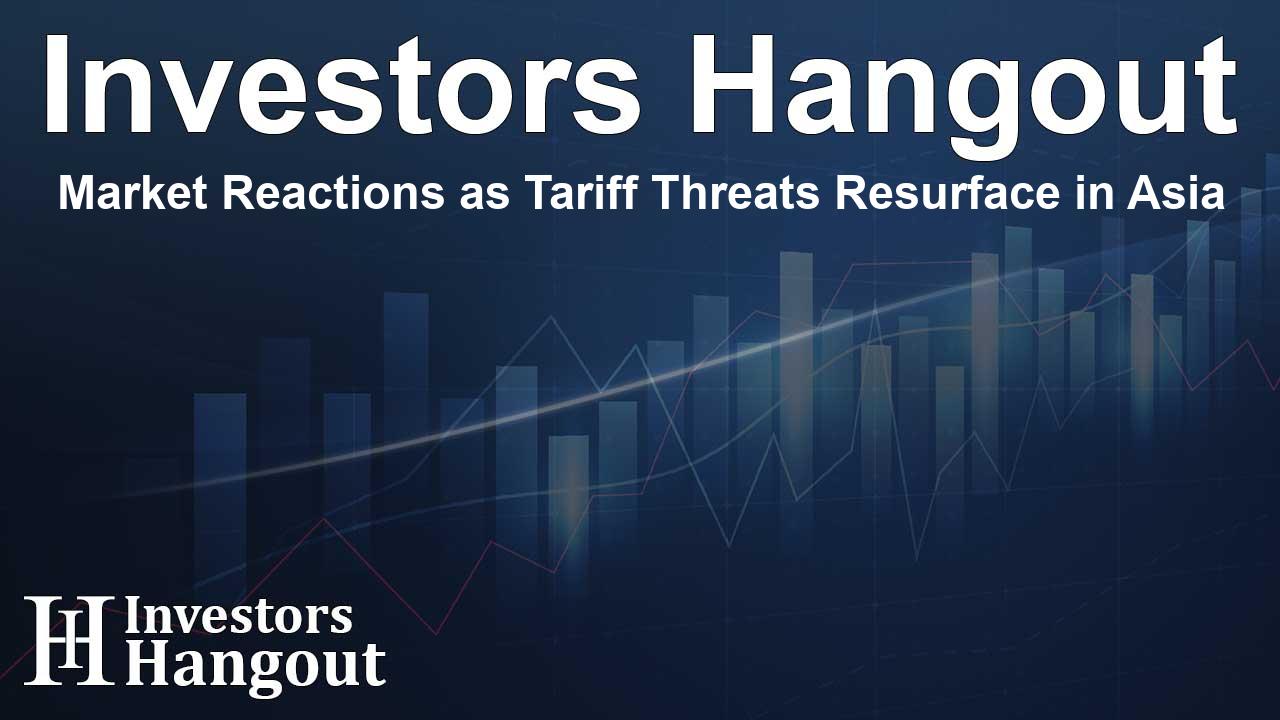Market Reactions as Tariff Threats Resurface in Asia

Asia's Market Reactions Amid Tariff Threats
Most Asian stocks experienced a downward trend recently, following alarming statements made by U.S. President-elect Donald Trump regarding potential trade tariffs. These declarations have reignited fears of a looming trade conflict, raising concerns among investors across the region.
Trump indicated on his platform that he intends to enforce an additional 10% tariff on goods imported from China, along with a staggering 25% on all products coming from Mexico and Canada. His rationale for these measures is tied to addressing issues of illegal immigration and drug trafficking that he associates with these border countries.
In contrast to current sentiments, the previous trading session observed a boost in stock indexes. This positive momentum was attributed to Trump’s nomination of Scott Bessent as Treasury Secretary, who is perceived as a more balanced voice in trade policy, potentially favoring Wall Street's perspectives in Washington.
Despite hitting record highs on Wall Street, U.S. stock index futures displayed limited movement during Asian trading, specifically muted responses following Trump's tariff announcements.
Japan's Nikkei 225 index faced a decrease of 1.2%, with the TOPIX index dropping by 1.3%. Both indexes had previously made gains of 1.2% and 0.7%, respectively, indicating recent volatility.
Meanwhile, South Korea's KOSPI index saw a modest decline of 0.6%, while Thailand's SET Index slipped by 0.2%. The fluctuations in these markets reflect broader concerns about international trade relations and their potential impacts.
For investors in India, futures for the Nifty 50 index hinted at a weaker market opening. A rally in the Indian benchmark appeared to be fading, alongside growing scrutiny towards the conglomerate Adani Group amid allegations of bribery and fraud by U.S. regulators.
Australia also shared in the downward momentum, with the S&P/ASX 200 index dropping 0.4% after achieving an all-time high in the prior session.
Positive Performance of Chinese Shares
Contrasting with the negative trends observed in other markets, Chinese shares displayed resilience amid the tariff threats. The Shanghai Shenzhen CSI 300 and Shanghai Composite indexes rose by 0.3% and 0.4%, with the Hong Kong Hang Seng index recording a notable 0.6% gain.
Although trade tariffs typically signal economic challenges for China, analysts anticipate that Beijing will introduce additional fiscal stimulus measures to mitigate adverse effects. Investors are keenly awaiting China's crucial political meetings scheduled for December, which may outline further fiscal strategies.
UBS analysts have suggested that China’s fiscal interventions could reduce the impact of the anticipated tariffs. However, a potential trade war with the U.S. raises concerns over disruptions in global trade and the implications for China’s export-driven economy.
Anticipated Economic Data and Central Bank Decisions
In South Korea, the central bank's decision regarding interest rates is expected this week. Notably, essential inflation data from Tokyo is set to be released shortly, which could influence the economic outlook.
India is also poised to unveil its third-quarter GDP report, which is highly anticipated by investors. Furthermore, China is expected to release the purchasing managers index data that might provide insights into its manufacturing sector’s health.
In the U.S., all eyes will be on the personal consumption expenditures (PCE) price index, regarded by the Federal Reserve as a vital indicator of inflation trends, due for release shortly.
Global Market Sentiment and Future Outlook
The overarching sentiment among investors appears cautious. Market participants are intently observing developments that could signal shifts in trade policy or economic performance across the region. As uncertainties persist, strategies for portfolio management and market engagement are being reevaluated in anticipation of further developments.
Frequently Asked Questions
What are the key factors currently affecting Asian stock markets?
The recent tariff threats from President Trump are significantly impacting investor confidence, leading to declines in most Asian stock indexes.
How have trade tensions influenced market reactions?
Trade tensions contribute to volatility in stock prices, as investors weigh the potential economic ramifications of renewed tariff implementations.
What economic indicators should investors be monitoring?
Investors should keep an eye on GDP reports, inflation data, and central bank decisions, which provide essential insights into economic health.
Are there any positive trends in Asian markets despite the negative news?
Yes, some Chinese shares have shown positive performance, indicating resilience amid tariff threats.
What are analysts predicting for the future of Asian economies?
Analysts expect that fiscal stimulus measures in places like China may help counteract some negative impacts associated with tariff threats.
About Investors Hangout
Investors Hangout is a leading online stock forum for financial discussion and learning, offering a wide range of free tools and resources. It draws in traders of all levels, who exchange market knowledge, investigate trading tactics, and keep an eye on industry developments in real time. Featuring financial articles, stock message boards, quotes, charts, company profiles, and live news updates. Through cooperative learning and a wealth of informational resources, it helps users from novices creating their first portfolios to experts honing their techniques. Join Investors Hangout today: https://investorshangout.com/
Disclaimer: The content of this article is solely for general informational purposes only; it does not represent legal, financial, or investment advice. Investors Hangout does not offer financial advice; the author is not a licensed financial advisor. Consult a qualified advisor before making any financial or investment decisions based on this article. The author's interpretation of publicly available data shapes the opinions presented here; as a result, they should not be taken as advice to purchase, sell, or hold any securities mentioned or any other investments. The author does not guarantee the accuracy, completeness, or timeliness of any material, providing it "as is." Information and market conditions may change; past performance is not indicative of future outcomes. If any of the material offered here is inaccurate, please contact us for corrections.